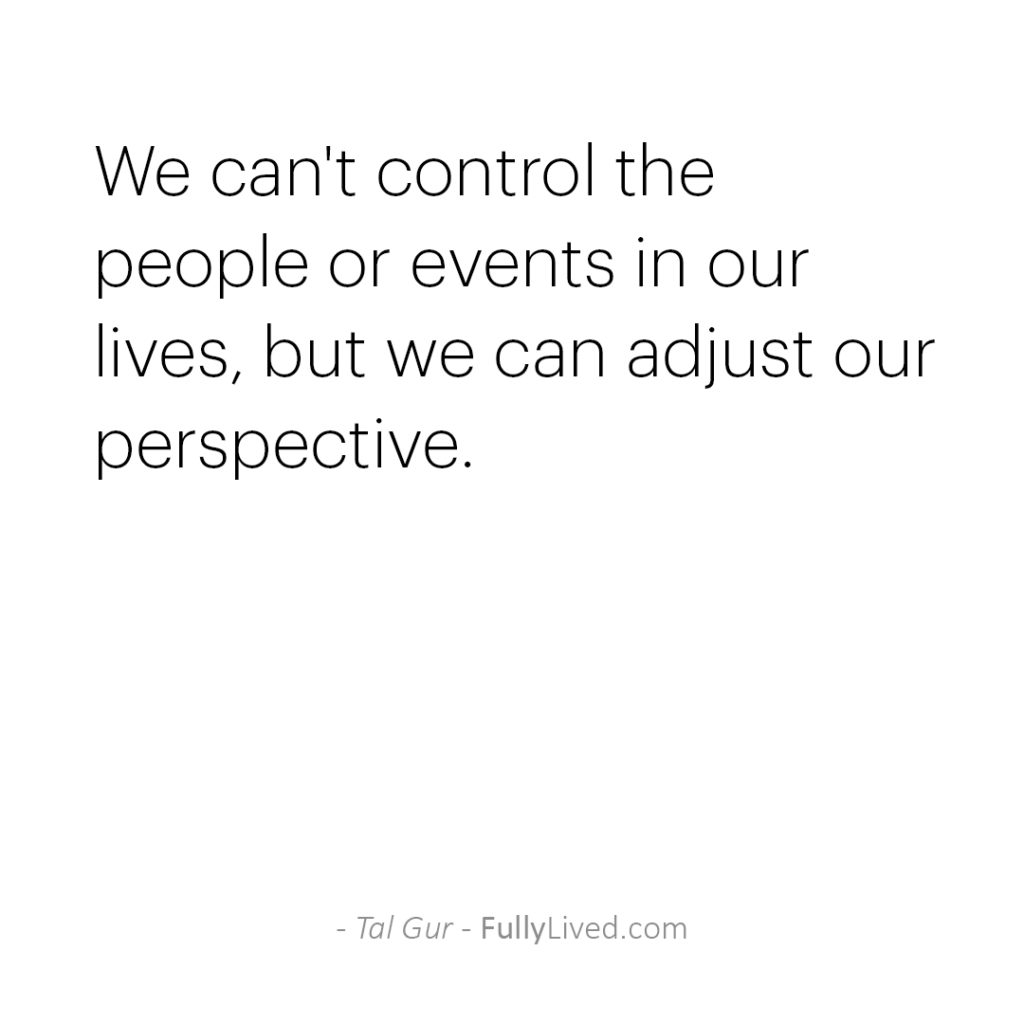We can’t control the people or events in our lives, but we can adjust our perspective.
The central message behind this quote is about control and perspective. It speaks to the fact that we often feel frustrated or unhappy because we try to control things that are simply beyond our control. In this case, it's referring to the people around us and the events that happen in our lives.
In other words, you might wish that your friend or partner would behave a certain way, or that a situation at work or school would unfold in your favor. When they don't, you might feel disappointed, stressed, or even resentful.
But here's the thing: We can't actually control other people's actions or the way events transpire. As much as we might want to, it's just not within our power. The world is complex and unpredictable, and everyone has their own thoughts, feelings, and motivations that guide their behavior.
However, what we can control is our perspective, our outlook on these circumstances. That's what the quote is emphasizing.
If a friend lets you down, you can choose to see it as a personal slight, or you can choose to see it as a reflection of their own struggles. If an event doesn't go as planned, you can view it as a disaster, or you can view it as an opportunity to learn and grow.
Adjusting your perspective doesn't mean ignoring your feelings or pretending everything is okay when it's not. It means acknowledging your feelings, but also acknowledging that there might be other ways to view the situation.
By adjusting our perspective, we can often find more peace, acceptance, and even positivity, even in the face of disappointments and setbacks. It's about embracing the reality of life's unpredictability and finding a way to navigate through it that leads to personal growth and emotional resilience.
And that's a pretty empowering message, isn't it? It's a reminder that we have more control over our lives and our happiness than we might think. Not by trying to control everything around us, but by controlling how we choose to perceive and respond to it.
Is there a historical example that illustrates the message of the quote?
One such example is the story of Nelson Mandela, a prominent South African leader and anti-apartheid activist.
Nelson Mandela spent 27 years in prison for his opposition to the apartheid regime in South Africa. During his long incarceration, he had no control over his circumstances or the people who imprisoned him. However, Mandela was able to maintain a positive and determined outlook by adjusting his perspective.
Instead of harboring bitterness and anger, Mandela chose to focus on reconciliation and forgiveness. He recognized that he couldn't change the past or control his captors, but he could control his response and mindset. Mandela saw his imprisonment as an opportunity to grow personally and to rally support for the anti-apartheid movement.
Upon his release from prison in 1990, Mandela continued to advocate for justice and equality, leading negotiations that ultimately dismantled the apartheid system and paved the way for democratic elections. He became the first black President of South Africa in 1994, emphasizing reconciliation and promoting a united, multi-racial country.
Mandela's story exemplifies the idea that while we may not have control over the circumstances or people that come into our lives, we can choose how we perceive and respond to them. Despite the immense challenges he faced, Mandela's positive perspective and unwavering commitment to justice played a crucial role in shaping the future of South Africa.

* To gain more inspiration and motivation for your personal growth journey, I recommend visiting my SMART goals page, which offers a wide range of goal ideas to help you establish new aspirations and achieve greater success in life. This list was crucial in the development of my own life goals list, consisting of 100 goals that I pursued for ten years.
Chief Editor
 Tal Gur is an author, founder, and impact-driven entrepreneur at heart. After trading his daily grind for a life of his own daring design, he spent a decade pursuing 100 major life goals around the globe. His journey and most recent book, The Art of Fully Living, has led him to found Elevate Society.
Tal Gur is an author, founder, and impact-driven entrepreneur at heart. After trading his daily grind for a life of his own daring design, he spent a decade pursuing 100 major life goals around the globe. His journey and most recent book, The Art of Fully Living, has led him to found Elevate Society.






















